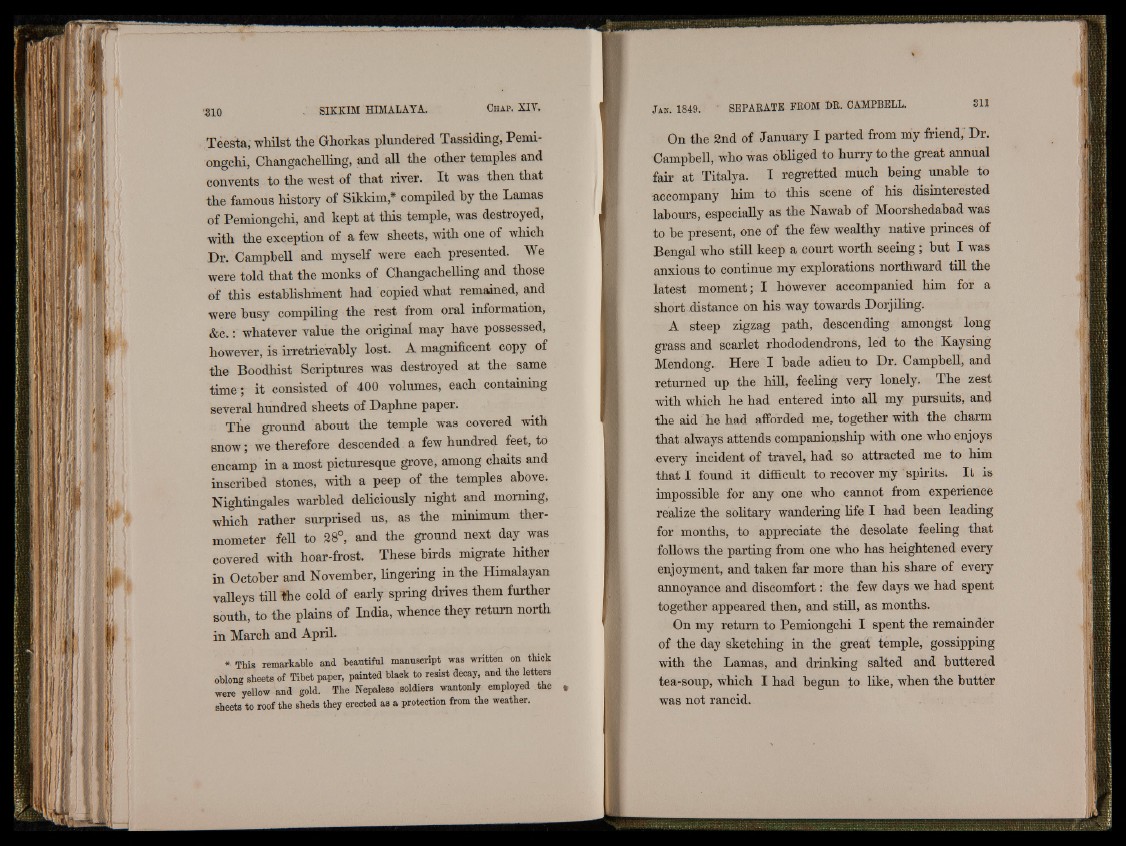
Teesta, whilst the Ghorkas plundered Tassiding, Pemiongchi,
Changaehelling, and all the other temples and
convents to the west of that river. I t was then that
the famous history of Sikkim* compiled by the Lamas
of Pemiongchi, and kept at this temple, was destroyed,
with the exception of a few sheets, with one of which
Dr. Campbell and myself were each presented. We
were told that the monks of Changaehelling and those
of this establishment had copied what remained, and
were busy compiling the rest from oral information,
&c.: whatever value the original may have possessed,
however, is irretrievably lost. A magnificent copy of
the Boodhist Scriptures was destroyed at the same
time; it consisted of 400 volumes, each containing
several hundred sheets of Daphne paper.
The ground about the temple was covered with
snow; we therefore descended a few hundred feet, to
encamp in a most picturesque grove, among chaits and
inscribed stones, with a peep of the temples above.
Nightingales warbled deliciously night and morning,
which rather surprised us, as the minimum thermometer
feH to 28°, and the ground next day was
covered with hoar-frost. These birds migrate hither
in October and November, lingering in the Himalayan
valleys till the cold of early spring drives them further
south, to the plains of India, whence they return north
in March and April.
* This remarkable and beantiful manuscript was written on thick
oblong sheets of Tibet paper, painted black to resist decay, and the letters
were yellow and gold. The Nepalese soldiers wantonly employed the
sheets to roof the sheds they erected as a protection from the weather.
On the 2nd of January I parted from my friend, Dr.
Campbell, who was obliged to hurry to the great annual
fair at Titalya. I regretted much being unable to
-accompany him to this scene of his disinterested
labours, especially as the Nawab of J\1 oorsliedal)ad was
to be present, one of the few wealthy native princes of
Bengal who still keep a court worth seeing; but I was
anxious to continue my explorations northward till the
latest moment; I however accompanied him for a
short distance on his way towards Dorjiling.
A steep zigzag path, descending amongst long
grass and scarlet rhododendrons, led to the Kaysing
Mendong. Here I bade adieu to Dr. Campbell, and
returned up the hill, feeling very lonely. The zest
with which he had entered into all my pursuits, and
the aid he had afforded me, together with the charm
that a lw a y s attends companionship with one who enjoys
every incident of travel, had so attracted me to him
that I found it difficult to recover my spirits. I t is
impossible for any one who cannot from experience
realize the solitary wandering life I had been leading
for months, to appreciate the desolate feeling that
follows the parting from one who has heightened every
enjoyment, and taken far more than his share of every
annoyance and discomfort: the few days we had spent
together appeared then, and still, as months.
On my return to Pemiongchi I spent the remainder
of the day sketching in the great temple, gossipping
with the Lamas, and drinking salted and buttered
tea-soup, which I had begun to like, when the butter
was not rancid.